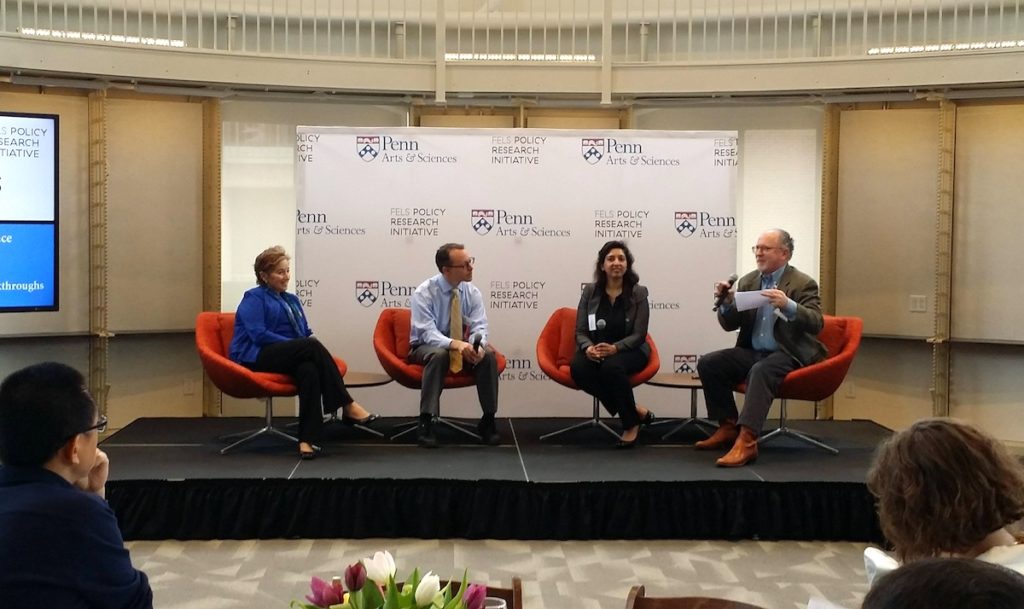How the City of Philadelphia is working with researchers to make better policies
 May 1, 2017
Category: Event, Feature, Featured, Medium, Method
May 1, 2017
Category: Event, Feature, Featured, Medium, Method
Dan Hopkins, a behavioral science researcher, has found that showing people exactly what they’re missing out on will encourage them to take advantage of new opportunities.
When they have it, it’s that much more important to them from then on: “Once you give someone something, they become protective of it,” Hopkins said.
The associate professor at the University of Pennsylvania’s School of Arts & Sciences was one of several researchers at the Fels Policy Research Initiative’s inaugural conference, Breakthroughs: New Ideas for Policy, held last Wednesday.
Launched in 2016, the initiative promotes research that can relate to, and hopefully improve, policies in government. It does this is in three ways: providing funding to research and working groups related to policy, sponsoring events and conferences, and working with media outlets to publish op-eds that touch on the connection between research and policy.
The grants provided by the initiative can be as much as $15,000, and the 2017 grant recipients included three new working groups and five conferences.
During the first panel of Wednesday, “Policy Research Into Practice in Philadelphia,” Hopkins explained his work with the Behavioral Science Initiative — including how this research into the ways people make choices can help the city “transform the delivery of policy and help transform the relationship our members of government have with its citizens, businesses and other stakeholders,” he said.
That research into missed opportunities? It’s being used to figure out a way to get more Philly residents to take advantage of earned income tax credit, something that can be hugely valuable to low-income residents. A way to do that, Hopkins says, is by “making sure residents of Philadelphia and other jurisdictions can see themselves” in these sorts of policy pushes.
Along with other goals like getting more people to use the Indego bike share system, the Behavioral Science Initiative ultimately wants to help the local government spend money on policy in the most efficient way possible.
Anjali Chainani, director of policy for the Mayor’s Office, touched on how that “efficiency” is something that’s needed when serving residents.
“We may be serving people but we may not be serving people as well as we could,” said Chainani, who also works with GovLabPHL, the team put together by the city for more evidence-based practice in city government. (You can learn more about them at this Philly Tech Week 2017 event.)
Chainani brought up the city’s ongoing discussion series on “human-centered design” for more strategic policy in response to an audience questions about how the community can take part in some of these discussions on public policy. The next public discussion is set for Sept. 28.
She also mentioned a “participatory design clinic” the city is planning to start this summer to bring experts and community members together to have discussions about how to improve where they live.
"We’re here to talk about incremental breakthroughs that over time add up to significant changes."
What about the moral implications of the research that’s being done?
Perelman School of Medicine professor Kristen Glanz, who runs a working group on “Built Environment Policies and Interventions for Better Health and Safety,” spoke on the caution necessary when working with people who may not want to be thought of as subjects of an experiment.
As Hopkins also added, it’s important for researchers and policy makers to take a step back sometimes from their proposed solutions and ask themselves the real question: “Is this working?”
One thing is certain, as it seems to be with anything involving people-centered design — all of this will take time.
Diana Lind, founding managing director of the Fels Policy Research Initiative, even mentioned that the conference’s lofty title isn’t indicative of the full reality of what the initiative and its projects are trying to accomplish:
“We’re here to talk about incremental breakthroughs that over time add up to significant changes in the way our government works and our society changes.”
Trending News










